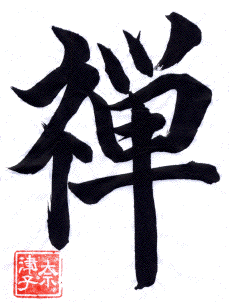Elysium, or Zen and the Art of Early Music

“Zen” ideogram by Natsuko
Life, the universe and performance practice
Some musings on the connections with Zen Buddhist philosophy and a brief discussion of Baldassare Castiglione’s decoro, sprezzatura and gracia.
What is Elysium, and why the reference to Zen in the title of this piece? In Greek mythology Elysium was the abode of the blessed after death (hence the Elysian Fields). By the seventeenth century the word had come to mean ‘the state or place of ideal happiness’. This state of bliss or heightened consciousness (there are many ways of not quite describing it) is not so far removed from the concept of satori or ‘awakening’ found in the Zen Buddhist tradition. Anyone who has been transported by a work of art will have been in Elysium.
However, the interconnections go further than this. Satori designates the sudden and intuitive way of seeing into anything. One seeks and seeks, but cannot find. One then gives up, and the answer comes by itself. Anyone who studies historical performance practice should bear this in mind.
After many years as a researcher and practitioner of early music I can only conclude that the great authentic versus inauthentic debate misses the point. Indeed, Richard Taruskin has argued persuasively that ‘historical’ performance today is not really historical. He believes that a thin veneer of historicism clothes a performance style that is completely of our time. This does not deny the importance and necessity of studying the historical evidence. As Taruskin notes, the most talented artists will use this evidence to enrich and enliven, to improve and refresh what they do. Many years ago Gustav Leonhardt expressed the following view:
If one can be sufficiently convincing, a performance will make an authentic impression; if one has to struggle to be authentic, one will never be convincing.
Baldassare Castiglione, in The Courtier (1528), described a philosophy of performance (and life) which is still relevant today. [Here I am indebted to Anthony Rooley’s wonderful little book Performance: Revealing the Orpheus Within, which is pitched at the performer and general reader alike.] Castiglione discusses three concepts or principles: decoro, sprezzatura and gracia.
Decoro embodies the outward show, the appearance of things, all that which the assiduous student (of life or the performing arts) can control and study, develop and refine.
The balancing principle to decoro is sprezzatura (which can be defined as ‘noble negligence’), a lightening-like energy which carries courage, boldness, even rashness, and excitement. It is a quality (or attitude) that cannot be practiced (that would turn it back into the realm of decoro); it is a delighting in the moment, a love of improvisation, a kind of calculated carelessness (Giulio Caccini, Le nuove musiche, Venice, 1602).
The central principle, to which the other two must submit, is gracia. It is a quality from the Divine, uncontainable, unknowable, without limit, belonging to no one; it will not manifest itself on request, but may, or may not, be present in any particular situation (or performance). Its presence is instantly recognised, by believer and unbeliever alike (though both will find different words to express it). It was described as both ‘divine frenzy’ and ‘sublime tranquility’. Writers agreed that gracia is a state of bliss (or Elysium).
Spontaneity (Castiglione’s sprezzatura) is another concept found in the Zen tradition, where it is called ‘naturalness’ (tzu-jan). It is highly appreciated in both life and art in several cultures of the Far East, and is particularly important in giving Zen its flavour. The Zen teaching that the student must learn to act spontaneously, without thinking and without self-consciousness or hesitation, is equally relevant to the student of performance practice.
The members of the Elysium Ensemble aim for this freshness and spontaneity, which we bring to our collaboration through discussion, rehearsal, experimentation and, most importantly, performance. We regard historical research as important and incumbent on our profession, without considering such effort as exceptional or particularly striking. For us, the use of period instruments is no longer extraordinary, which allows them to resume their proper place as ‘instruments’ in the service of music. We aim to move and persuade, to educate and entertain. Our desire is a re-creation (creation anew rather than restoration) necessarily in terms of our own twentieth-century (multi-) culture.
This is an edited extract from an article published in ‘ABC Radio 24 Hours’ magazine (March 1995).